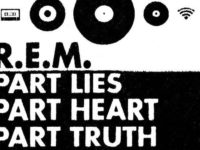I tend to think of R.E.M. as two different bands, from two different times. There’s the IRS years … and the Warner Bros. years. While there is a little overlap – “It’s The End of the World As We Know It (And I Feel Fine)”, for example – R.E.M.’s style began to move away from garagey folk on Green.
Now, this of course is my perception of R.E.M. Do they think that such a stylistic shift happened? Was their songwriting process different? I don’t have those answers … because they don’t really matter. What does matter is that I’ve been listening to these guys for a long time.
Songs like “Radio Free Europe” and “(Don’t Go Back to) Rockville” will always be associated with those college nights spent listening to albums like Murmur at my friend Gene’s parents house up in Bangor, Maine. The music made a big impression on me, so that time period comes along for the ride.
The rest of the pre-Warner Bros. stuff is in there too because, let’s face it, does anyone really feel like an adult when they first get out of school? Not me. It took a few years. A job. A marriage. A mortgage … and then R.E.M. comes out with “Stand” … and suddenly, it appears that things have changed.
This is not going to turn into an R.E.M.-bashing, they’ve-sold-out / they-used-to-be-great / now-they-suck thing. No, my apparent “musical romanticism” and sense of loyalty won’t allow that. So let’s talk about … R.E.M. during the Warner Bros. era, covered here on In Time: The Best of R.E.M. 1988–2003.
I think of this period as R.E.M, The Adult Years. What does this mean? So much stuff happened to me post-1988. The cover band, divorces (mine and others), war, new love, career weirdness, marriage. You know, the usual stuff. Do I attach specific events to songs? No. Instead … there are a few artists whose music I use as a source of inspiration (or sometimes refuge), and certainly R.E.M. fits here.
When I’m sad, happy, or in need of a good kick in the pants — out comes Automatic For the People, New Adventures in Hi-Fi, or Reveal. (My other music-as-therapy artists? Springsteen, Dylan, Pat Metheny, Greg Brown.)
Like any other aging vinyl addict, what’s the first thing I do after opening the package? That’s right: read the liner notes. And In Time: The Best of R.E.M. 1988–2003 has some fantastic track-by-track commentary written by Peter Buck. I can never get enough of this kind of thing.
Years of living with a body of music makes me wonder what the artist was thinking. Aside from your typical VH1-type details – why was a song included on (or left off of) an album, etc. – you get to see that Buck (and the other members of the group, I suspect) is also a fan of music.
His description of working with Patti Smith on “E-Bow the Letter”: It was such an incredible experience watching Patti sing this song – a song we wrote! I had all the cliche reactions: chills ran up and down my spine, the hair stood up on the back of my neck, etc. My life did not flash before my eyes, but it was a close thing. When the session was over, I walked out into the night high as a kite, completely transported.
He also makes a terrific point about how songs can take on a life of their own when he speaks of “Everybody Hurts”: This song doesn’t really belong to us anymore; it belongs to everybody who has ever gotten any solace from it.”
It’s not all serious, though. (Ain’t rock supposta be fun?) On “Orange Crush”: I must have played this song onstage over three hundred times, and I still don’t know what the fuck it’s about. I don’t know that I believe him, but it’s still pretty danged funny.
Buck also talks about the ease with which “Losing My Religion” came together: When I think about “Losing My Religion,” I think about the process of writing and recording it, and how dream-like and effortless it was. The music was written in five minutes; the first time the band played it, it fell into place perfectly. Michael had lyrics within the hour, and while playing the song for the third or fourth time, I found myself incredibly moved to hear the vocals in conjunction with the music. To me, “Losing My Religion” feels like some kind of archetype that was floating around in space that we managed to lasso. If only all songwriting was this easy.
So, in the context of R.E.M., The Adult Years, this is a pretty good set. The big hits are on In Time: The Best of R.E.M. 1988–2003, some good tracks from the most recent records (which stand up quite well), soundtrack items, and even a couple of new tunes.
I was surprised when they moved on after what happened on the Monster tour, and after Bill Berry’s retirement. Up wasn’t one of my favorite releases, but Reveal showed some real promise. Couple that with the cool “Animal,” featuring a “Tomorrow Never Knows” vibe, and it quickly became clear that there was something to look forward to: R.E.M., The Middle-Age Years.
- How Eric Clapton’s ‘Me and Mr. Johnson’ Made the Case for British Blues - March 20, 2024
- Why Todd Rundgren’s ‘Back to the Bars’ Remains So Powerful - December 13, 2023
- Reevaluating Bruce Springsteen’s ‘The Wild, the Innocent and the E Street Shuffle’ - September 11, 2023




